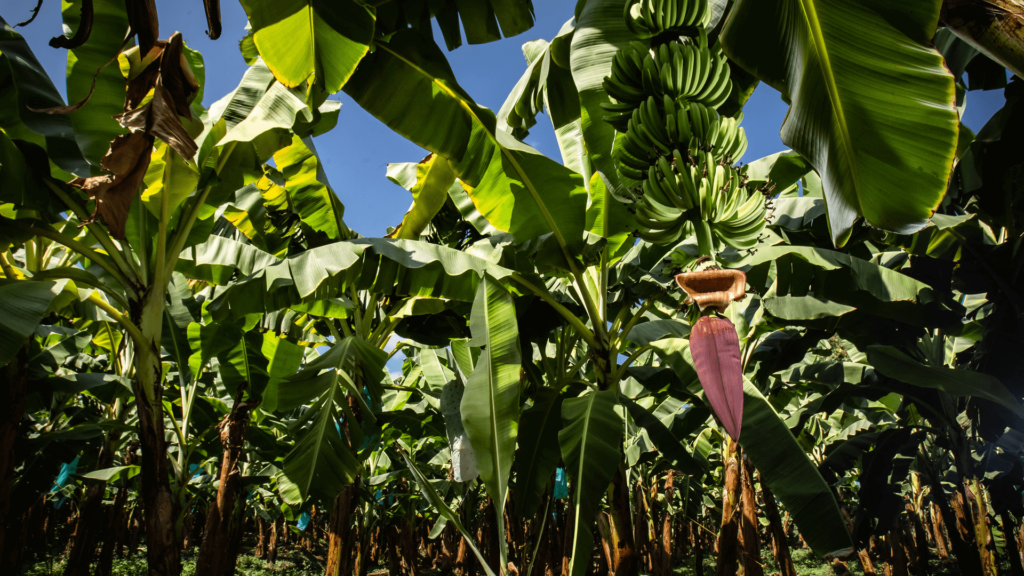Nurturing biodiversity and reducing carbon footprint is the name of the game with CLAC PIP’s banana improvements
We all love bananas and they are a staple food in our diet and our shopping trolley. Increasingly people are concerned about where their food comes from and how it is produced, so they choose Fairtrade and other certification schemes.
Fairtrade’s Producer Network for Central, Latin America and the Caribbean (CLAC) represents banana growers’ organisations in countries such as Colombia, Costa Rica, Panama and the Winward Islands, who provide up to 15 per cent of the UK’s bananas, whether you bake them in bread, consume them with cereal or enjoy them in a banana split.
Bananas are the eighth most important food crop in the world, they are grown in 135 countries and they are the world’s most commercial fruit.
Behind those facts is a more complicated story and a number of challenges, the poverty of producers, damage caused by agrichemicals, and an urgent need to implement measures to tackle the effects of climate change.
The Productivity Improvement Programme (PIP) was launched by CLAC in 2015 to improve soil fertility, increase productivity and cut the use of agrichemicals in half. PIP has grown from working with 20 small producer organisations and co-operatives 5 years ago, to engaging with 374 in 2018.
PIP is showing positive results after 5 years of hard work to improve soil fertility and banana production.
In the recent past, pressure to maximize the numbers of bananas produced led to excessive use of agrichemicals which have damaged the fertility of the soil and caused productivity to drop, while making crops more vulnerable to disease, including TR4.
Small banana farmers face stiff competition from larger producers entering the Fairtrade market, leading to more competition and the need to maximize productivity, which in turn increases pressure to grow more bananas by whatever means possible.
Reversing the damage to soil fertility while limiting the use of agrichemicals is a priority which small producers and Fairtrade are working to address together. Training and visits to farms involved in PIP is also available for other producers to join.
Following these measures has increased the number of bananas grown by 565 boxes per hectare on average after two years, and the incomes of small producer co-ops have risen by £4704 ($6,179) in that time.
What’s more, if the bananas are sold under Fairtrade terms during that period, it generates £430.19 ($565) in Fairtrade Premium. Fairtrade organisations democratically decide what to spend their Premium payments on, and the community projects supported vary from providing education, health facilities, housing or clean water.
Nurturing and strengthening soil health by adding organic fertilizer and growing other crops with bananas to get away from monoculture is an important part of PIP.
To decrease carbon foot print, following PIP practices has led to a drop of 35 per cent in the use of agrochemicals by small banana producers. Use of water for irrigating the crops has dropped by half, reducing the overall water footprint, which all helps to meet targets when tackling climate change.
To protect the health of the soil for the future, it is essential to increase biodiversity, adding micro-organisms which improve resistance to fungi, viruses and bacteria that cause diseases in plants.
Over its first year, the PIP soil health program produced an increase in soil biological diversity in treated land plots of more than 300 per cent.
Combined with the increase in Fairtrade producers’ incomes, the PIP is a powerful tool to help the banana industry reduce production costs and meet Sustainable Development Goals.
Open the CLAC’s full report pdf here
– – ENDS – –
Notes for Editors
SDGs CLAC PIP meets:
- No poverty
- Zero hunger
- Clea water and sanitation
- Decent work and economic growth
- Responsble consumption and production
- Climate action
- Life on land
- Partnerships for the goals
About Fairtrade
The international Fairtrade system exists to end poverty through trade. The Fairtrade Foundation is an independent certification body and NGO which licenses the use of the FAIRTRADE Mark on more than 5,000 products which meet its rigorous social, economic and environmental standards. This independent label signifies to consumers that farmers and workers across 73 developing countries are getting a better deal from trade.
Today, more than 1.6 million people who work hard to produce coffee, tea, cocoa, bananas, wines, flowers, cotton, gold and many other products benefit from Fairtrade, which campaigns for as well as enables a fairer system of global trade.
Beyond certification, the Fairtrade Foundation is deepening its impact by delivering specialist programmes to help disadvantaged communities boost productivity in the face of challenges such as climate change.
Fairtrade Foundation contact details
5.7 The Loom | Gowers Walk | London | E1 8PY
Tel: +44 (0)20 7405 5942 │ Fax: +44 (0)20 7977 0101 │fairtrade.org.uk
Company Registered in England and Wales number 2733136. Registered Charity number 1043886. VAT number 672 5453 23
